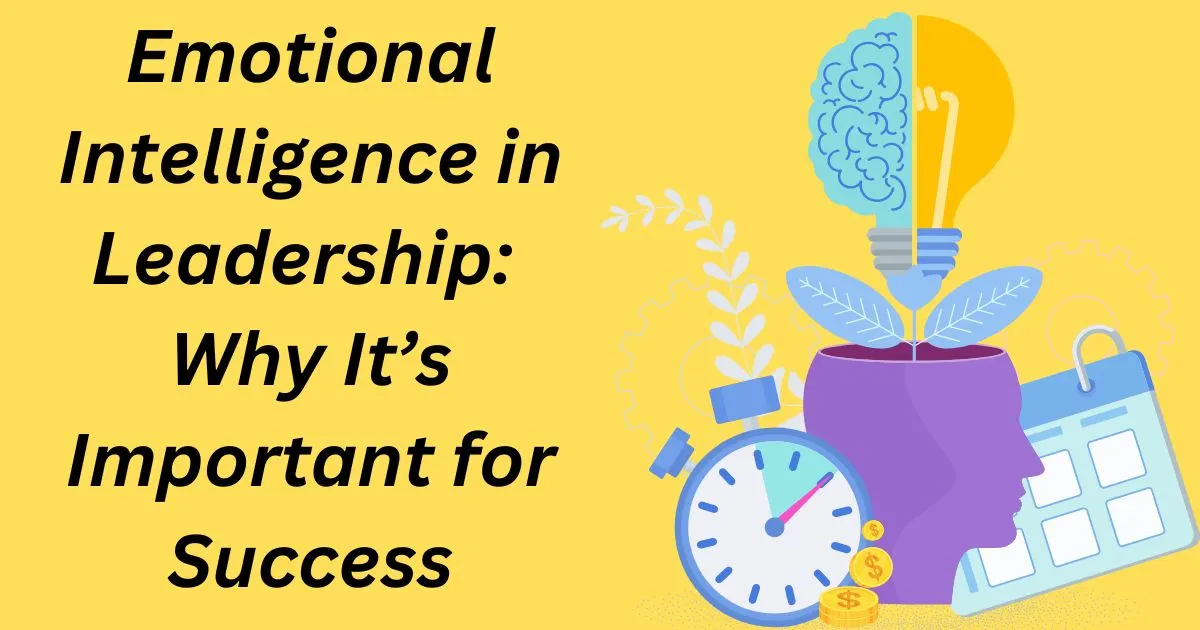Last updated on February 7th, 2026 at 10:30 am
Emotional Intelligence in Leadership is what it takes to be a truly great leader. Is it just about having the right skills, or is there something deeper? In today’s world, emotional intelligence in leadership has become more important than ever.
It’s not only about knowing your stuff, it’s also about understanding your own feelings and the emotions of those around you. Leaders with high emotional intelligence can create a positive work environment, build strong connections with their teams, and inspire everyone to do their best.
What is Emotional Intelligence in Leadership?
According to the World Economic Forum, emotional intelligence will be one of the top 10 skills needed for success by 2025. This speaks volumes about the growing importance of EI in leadership.
The Core Components of Emotional Intelligence
Emotional Intelligence in leadership is typically broken down into five key components:
1. Self-Awareness
Leaders with high EI are aware of their emotions and how they impact their decision-making and interactions with others. This self-awareness is the first step in emotional regulation.
2. Self-Regulation
This refers to a leader’s ability to manage their emotions, particularly in stressful situations. Leaders who can control their emotions remain calm under pressure and avoid impulsive decisions.
3. Motivation
Emotionally intelligent leaders are driven by more than just financial incentives. They have an internal passion to achieve goals and inspire their teams to work toward a shared vision.
4. Empathy
Empathy is the ability to understand and share the feelings of others. In leadership, this is essential for building trust, addressing concerns, and offering support during challenging times.
5. Social Skills
Strong social skills are crucial for managing relationships and navigating complex workplace dynamics. Leaders with high EI excel in communication, conflict resolution, and collaboration.
Why Emotional Intelligence is Important for Leadership
1. Improved Communication
Leaders with high EI communicate more effectively because they can tailor their message to the emotional needs of their audience. Whether in one-on-one meetings or team briefings, these leaders foster clarity, understanding, and connection.
2. Enhanced Team Performance
A study by the Institute for Health and Human Potential found that teams led by emotionally intelligent leaders can improve team performance by up to 30%. This improvement stems from better collaboration, higher morale, and trust, which leads to increased productivity.
3. Conflict Resolution
Conflicts are inevitable in any workplace. However, leaders with emotional intelligence are adept at understanding the emotional dynamics of disputes and can facilitate constructive conversations. This ability helps prevent escalating conflicts and ensures a harmonious work environment.
4. Employee Retention
Leaders who demonstrate empathy and understand their employee’s emotional needs tend to have higher employee satisfaction.
In fact, organizations with high EI among their leaders report up to 50% lower turnover rates.
5. Adaptability in Change
Leaders with strong emotional intelligence can help their teams deal with uncertainty in today’s business world. They understand the feelings that come with change and offer support, making it easier for everyone to adjust and feel less anxious during transitions.
How Emotional Intelligence Drives Leadership Success
- Inspiring Leadership
Leaders with high EI create an environment of trust and respect, inspiring their teams to reach their full potential. These leaders connect with their team members on a personal level, understanding their motivations and challenges.
Examples of Emotional Intelligence in Leadership
- A Manager Handling Conflict
A manager notices tension between two employees. Instead of ignoring the issue, they address it by facilitating an open conversation where both team members can express their perspectives. The manager listens actively, acknowledges the emotions involved, and helps guide the team toward a mutually agreeable solution.
- A Leader Supporting During Stressful Times
During a stressful project, an emotionally intelligent leader regularly checks in with their team. They offer encouragement, acknowledge the emotional strain, and provide necessary resources to help the team cope with the pressure. This type of support fosters loyalty and commitment.
- An Executive Adapting to Change
When a company undergoes restructuring, an emotionally intelligent executive communicates transparently with employees, addressing their concerns and providing reassurance. The leader also helps employees navigate the emotional challenges of change by offering support and guidance.
How to Develop Emotional Intelligence as a Leader
 |
| Emotional Intelligence in Leadership: Why It’s Important for Success |
1. Practice Self-Reflection
Regularly assess your emotional responses and the impact they have on your decisions. Keeping a journal can help you track your emotions and gain insight into how they influence your leadership style.
2. Ask for Feedback
Ask your team for feedback on your leadership style and emotional reactions. Constructive feedback helps you identify areas for improvement and deepen your self-awareness
3. Develop Empathy
Engage in active listening and show a genuine interest in understanding your team’s perspectives. Empathy helps you connect with your team and respond effectively to their emotional needs.
4. Learn Stress Management
Practice stress management techniques such as mindfulness, deep breathing exercises, or taking short breaks. Managing your own stress helps you stay composed and effective, even in challenging situations.
Emotional Intelligence in Leadership Training & Activities
Conclusion:
As the work environment changes, those who prioritize emotional intelligence will inspire and guide their teams to success. In short, emotional intelligence is not just important it’s essential for great leadership and lasting organizational success.
Key Statistics & Sources:
- Talent Smart (2023): 90% of top performers have high emotional intelligence.
- Institute for Health and Human Potential: Teams led by emotionally intelligent leaders see up to 30% improvement in performance.
- World Economic Forum: Emotional intelligence is one of the top 10 skills for success by 2025.
- Center for Creative Leadership (2024): Organizations with high EI among leaders report up to 50% lower turnover rates.
How do you practice emotional intelligence in your leadership role? Share your thoughts and experiences in the comments below!


